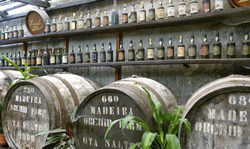Entry and important informations
Entry requirements:
(Information at the Foreign Office)
To check in at the airlines, you need a valid identity card or passport. Swiss citizens need a passport or a valid identity card to enter.
Currency:
Credit cards and debit cards are accepted as means of payment almost everywhere. With your debit card, you can withdraw money at ATMs at any time.
Loss / theft of EC / credit cards:
In case of loss or theft of your debit or credit card, immediately inform your credit card company to block your card. The emergency call is available 24 hours a day:- Blocking emergency (0049) 116 116 +49 30 4050 4050
- American Express (0049) 69 979 710 00
- Diners Club (0049) 69 661 661 23
- MasterCard (Eurocard) 001 314 275 669 0
- Visa 001 410 581 38 36
- ec cards emergency service (0049) 1805 021 021
Language:
Time shift:
Telephone and internet:
The internet in Madeira is very well developed and you will find zones, cafés and bars where you can log in to check emails or do other things. Almost all hotels have Wi-Fi zones.
Customs regulations for Madeira:
As Madeira is a member of European Economic and Monetary Union, there are few restrictions on the import and export of goods. Observe the usual restrictions on the transport of certain goods, such as cigarettes or alcohol.
In addition, the import and export of plants and animals is strictly regulated, as the island's unique ecosystem is very vulnerable to the effects of external species.
Souvenir purchases:
Willow products are everywhere in the city of Funchal - one of the biggest shops in Rua do Castanheiro - and on the whole island, but the most important center for pasture products with the largest selection is in the village of Camacha.
Embroidery- Shops - often in conjunction with a factory - are everywhere in the city center of Funchal.
There are several Madeira wineries and specialty shops in Funchal and the surrounding area where wine tastings are offered and where your purchases are packaged professionally for safe home transport (e.g., Diogos Wine Shop, Madeira Wine Company, Oliveiras)
The flowers of Madeira, such as orchids, birds of paradise flowers, white-winged sitting, flamingo flowers, etc., are the most popular souvenirs that, once arrived at home, make the feeling that the holiday would last a little longer. These flowers can be bought everywhere in Funchal - at the local market, at the flower stalls in the city center or in the flower shops. At all of these outlets your flowers are packed in special boxes for safe transport so you can enjoy them at home for as long as possible.
Vaccines for Madeira:
Medical supplies:
Excerpts from the website of the Foreign Office ...
The level of medical care is generally satisfactory, but in rural areas in particular longer journeys may have to be taken into account. In Portugal, all persons who are legally insured in Germany are entitled to treatment, if urgently required, from doctors, dentists, hospitals, etc., who have been approved by the Portuguese statutory health insurance institution. As proof, the European Health Insurance Card (EHIC) or replacement certificate (both documents can be obtained from your health insurance). The cost of a private medical treatment is usually higher than in Germany and must be paid in cash.Medicines that you need all the time should be brought in sufficient quantities from home.
MALARIA
Portugal, also the Azores and Madeira are considered malaria free.Insurance:
Irrespective of this, it is strongly recommended that you take out travel health insurance for the duration of the stay abroad, covering risks that are not covered by the statutory health insurance funds (eg necessary repatriation to Germany in case of illness, treatment with private doctors or in private clinics).Drinking water:
The tap water is drinkable throughout the island. Mineral water is available everywhere. Important addresses:
Embaixada da República Federal da Alemanha
Campo dos Mártires da Pátria 38
1169-043 Lisboa, Portugal
Tel.: 00351 21 / -8810210
Fax: 00351 21 / -8853846
E-Mail: This email address is being protected from spambots. You need JavaScript enabled to view it.
Embassy of the Portuguese Republic in Germany
Zimmerstraße 56
10117 Berlin, Germany
Tel.: 0049 (0)30 / -590063500
Fax: 0049 (0)30 / -590063600
E-Mail: This email address is being protected from spambots. You need JavaScript enabled to view it.
Online: http://www.botschaftportugal.de
Did you know?
The famous Madeira wine
The worldwide unique Madeira wine.
The Madeira wine was created by sheer coincidence. In the 15th century, Portuguese sailors took port wine in wooden barrels on their long voyages. At the end of the journey, which often led through the tropics, they discovered that leftover wine became softer and milder. He gained in taste and so the transport of port wine was carried out from then on targeted. Today, the wine is no longer sent on the long sea voyage, but stored for three to five months at 45 ° C to 75 ° C.
Madeira wine can be very valuable: a bottle of Madeira wine became famous because it was bought at the Sotheby's auction house in New York on May 10, 1997 for around $ 22,000. It was a Madeira wine from 1800, once owned by Thomas Jefferson. The bottle was auctioned by Barrie Larvin, owner of the Hotel Casino Rio de Las Vegas.
Vintage Madeira is the premier class of Madeira wines. He carries a year on the bottle and contains only wine from this vintage. It must be made from one of the noble grape varieties (Sercial, Verdelho, Bual, Malvasia, Terrantez) and matured for at least 20 years in the barrel. Most vintage Madeira, however, store much longer in the barrel, sometimes more than a hundred years. Also, the traditional Canteiro process, in which the wines are heated by the sun, is prescribed. A glass of such a fine Madeira wine at the end of the day means enjoying Madeira.



